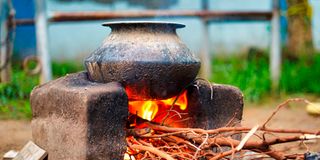Lurking danger of harmful cooking fuel in schools

Harmful fuel greatly endangers the environment.
What you need to know:
- Other adverse health effects associated with biomass fuel are low birth weight, cataracts and lower respiratory tract infections.
- Kemri highlighted that in sub-Saharan Africa, household air pollution is responsible for more than 680,000 premature deaths each year.
Ninety per cent of Kenyan schools depend on harmful wood fuel for cooking, according to scientists at the Kenya Medical Research Institute (Kemri) and the University of Liverpool.
Speaking at the 14th Kemri annual scientific and health conference (KASH), the researchers highlighted that a typical boarding school consumes 250 tonnes annually.
The fuel does not only endanger the environment but also the health of thousands of people.
“This practice results in high levels of particulate matter that are detrimental to health, significantly exceeding World Health Organization(WHO) guideline levels. This exposure extends beyond school kitchens, infiltrating classrooms and playgrounds,” Dr James Mwitari, co-director Clean Air Africa based at Kemri, said.
He noted that this is why Kemri and partners have teamed up with Equity Bank to scale up clean cooking in East African schools to address climate change and provide public health benefits.
Dr Mwitari said the vision of transitioning schools to clean cooking fuel by 2025 in tandem with the recent presidential decree is on course and achievable with collaborative arrangements such as this.
However, he regretted that their ongoing research has shown that the PM2.5 (a notorious health-damaging pollutant) is being produced in school kitchens from biomass fuels.
The biomass, which is in excess of the WHO guidelines, is putting cooks, children and teachers at risk of developing pulmonary and cardiovascular diseases.
Other adverse health effects associated with biomass fuel are low birth weight, cataracts and lower respiratory tract infections.
NIHR CLEAN-Air Africa, a global health research unit spearheaded by the University of Liverpool and Kemri, will employ mixed-methods research and advanced air pollution monitoring to evaluate the impact of the clean cooking initiative.
The unit notes that household air pollution kills 3.2 million people each year (237,000 children under five years) in sub-Saharan Africa. “32 per cent ischaemic heart disease, 23 per cent stroke, 21 per cent lower respiratory infection, 19 per cent chronic obstructive pulmonary disease and six per cent lung cancer.”
Kemri explained that because Equity has been facilitating schools to transition to clean cooking with Liquefied Petroleum Gas (LPG) under it’s “Clean Cooking Initiative, it made sense to partner with them.
Equity will build the capacity of institutions to transition to clean cooking and also work closely with the CLEAN-Air Africa team to measure health impacts before and after transition in institutions across the country.
The bank will also help in disseminating the study findings to relevant stakeholders with key target to policy makers to influence policies.
“Kenya's education sector alone consumes over 10 million trees annually to keep their kitchens operational. This leads to deforestation, greenhouse gas emissions, and adverse health outcomes,” Eric Naivasha, associate director, Energy, Environment & Climate Change at Equity Group Foundation, said.
He said they have developed a clean cooking initiative targeting learning institutions to transition from biomass fuel to cleaner fuels like LPG.
Dr Mwitari explained that the partnership involves Equity making loans available for schools to acquire cooking stoves.
Dr Joyce Wacimwe, the head of Division Research and Innovation at the Ministry of Health, observed that household air pollution from the use of dirty and polluting fuels (crop residues, cow dung, firewood, charcoal, kerosene) causes at least 23,000 annual deaths in Kenya every year.
“More than 900 million people (85 per cent of the region) rely on polluting fuels in Sub-Saharan Africa- the highest dependence worldwide.”
Kemri highlighted that in sub-Saharan Africa, where a substantial proportion of people rely on these fuels, household air pollution is responsible for more than 680,000 premature deaths each year, greater mortality than for both malaria and HIV/Aids.





